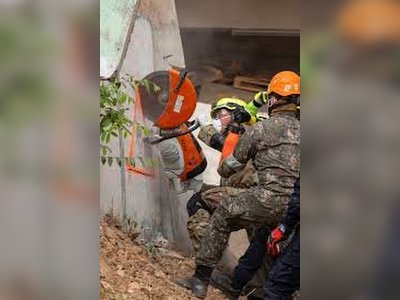
Poland's Tusk Accuses Russia of Plotting Global Airline Terror Attacks
Allegations arise amidst heightened tensions, citing incendiary devices targeting global flights.
In a startling accusation, Polish Prime Minister Donald Tusk has publicly claimed that Russia has been orchestrating plans to execute terrorist attacks on airlines across the globe.
Tusk’s announcement came during a meeting with Ukrainian President Volodymyr Zelenskyy and has further escalated tensions between Moscow and Western nations.
Tusk stated, 'I can only confirm that Russia planned acts of air terror, not just against Poland but against airlines across the globe.' However, he refrained from providing detailed evidence to support these assertions.
This development follows a report by The New York Times which suggested that U.S. intelligence had intercepted information regarding Russia's intention to smuggle incendiary devices onto cargo planes destined for the United States.
The report noted that the White House had subsequently issued a cautionary message to Moscow, demanding the cessation of these plans.
These allegations are not without precedent.
Russia has previously faced accusations concerning engagement in hybrid warfare tactics across Europe, which reportedly include the disruption of transport infrastructure and jamming of GPS signals.
Such activities are said to form part of Russian President Vladimir Putin’s broader strategic objectives against Europe.
In April 2024, Martin Kupka, the Czech Transport Minister, claimed that Russia had attempted numerous attacks on European rail systems, further cementing these narratives of sabotage.
However, Kremlin representative Dmitry Peskov dismissed these statements as 'baseless.'
Adding to the historical context, recent accusations against Russia involve the shooting down of an Azerbaijani passenger jet in Kazakhstan, resulting in 38 fatalities.
This tragic incident is reminiscent of the 2014 downing of Malaysia Airlines Flight MH17, which resulted in 298 deaths and involved Russian-backed separatists in Ukraine.
Amid these tensions, incendiary parcel attacks have been reported in the U.K., Germany, and Poland over the summer.
Devices caught fire both at Birmingham and Leipzig airports, raising alarms over potential catastrophic events if they had ignited mid-flight.
Reports suggest these were trials for more extensive operations targeting the United States.
The devices originated from Lithuania and were allegedly hidden within mundane objects such as massagers, revealing vulnerabilities in parcel security scanning protocols.
Such incidents prompted secretive yet stringent safety enhancements worldwide to prevent potential airborne disasters.
In a tacit acknowledgment of the severity of these threats, U.S. President Joe Biden's administration reportedly dispatched senior officials to communicate to Putin that any progression of these plots would result in Russia being held accountable for fostering terrorism.
These allegations, complex and intertwined, have yet to elicit a formal response from Moscow.
Historically, Russia has consistently denied involvement in such activities, from explosions in courier depots to broader acts of international sabotage and espionage attributed to Russian operatives.
As the international community grapples with these claims, the geopolitical landscape witnesses another surge in turbulence, with implications that may reverberate globally.
Tusk’s announcement came during a meeting with Ukrainian President Volodymyr Zelenskyy and has further escalated tensions between Moscow and Western nations.
Tusk stated, 'I can only confirm that Russia planned acts of air terror, not just against Poland but against airlines across the globe.' However, he refrained from providing detailed evidence to support these assertions.
This development follows a report by The New York Times which suggested that U.S. intelligence had intercepted information regarding Russia's intention to smuggle incendiary devices onto cargo planes destined for the United States.
The report noted that the White House had subsequently issued a cautionary message to Moscow, demanding the cessation of these plans.
These allegations are not without precedent.
Russia has previously faced accusations concerning engagement in hybrid warfare tactics across Europe, which reportedly include the disruption of transport infrastructure and jamming of GPS signals.
Such activities are said to form part of Russian President Vladimir Putin’s broader strategic objectives against Europe.
In April 2024, Martin Kupka, the Czech Transport Minister, claimed that Russia had attempted numerous attacks on European rail systems, further cementing these narratives of sabotage.
However, Kremlin representative Dmitry Peskov dismissed these statements as 'baseless.'
Adding to the historical context, recent accusations against Russia involve the shooting down of an Azerbaijani passenger jet in Kazakhstan, resulting in 38 fatalities.
This tragic incident is reminiscent of the 2014 downing of Malaysia Airlines Flight MH17, which resulted in 298 deaths and involved Russian-backed separatists in Ukraine.
Amid these tensions, incendiary parcel attacks have been reported in the U.K., Germany, and Poland over the summer.
Devices caught fire both at Birmingham and Leipzig airports, raising alarms over potential catastrophic events if they had ignited mid-flight.
Reports suggest these were trials for more extensive operations targeting the United States.
The devices originated from Lithuania and were allegedly hidden within mundane objects such as massagers, revealing vulnerabilities in parcel security scanning protocols.
Such incidents prompted secretive yet stringent safety enhancements worldwide to prevent potential airborne disasters.
In a tacit acknowledgment of the severity of these threats, U.S. President Joe Biden's administration reportedly dispatched senior officials to communicate to Putin that any progression of these plots would result in Russia being held accountable for fostering terrorism.
These allegations, complex and intertwined, have yet to elicit a formal response from Moscow.
Historically, Russia has consistently denied involvement in such activities, from explosions in courier depots to broader acts of international sabotage and espionage attributed to Russian operatives.
As the international community grapples with these claims, the geopolitical landscape witnesses another surge in turbulence, with implications that may reverberate globally.












